Letters from George Lawrence to Spencer Baird (Drafts)

George Lawrence drafts two letters to Spencer Baird regarding the selection and naming of bird specimens, in addition to the details of his visit to Rhode Island. Transcripts included.


George Lawrence drafts two letters to Spencer Baird regarding the selection and naming of bird specimens, in addition to the details of his visit to Rhode Island. Transcripts included.

George Lawrence writes six letters to Spencer Fullerton Baird, Assistant Secretary of the Smithsonian Institution, regarding the exchange and naming of various bird specimens. Transcripts included.

George Lawrence drafts six letters to Spencer Fullerton Baird, the Assistant Secretary of the Smithsonian Institution, that include a list of avian specimens from Costa Rica and Panama to be sent to Baird, as well as other specimens requested by t

David Erskine, the Earl of Buchan, writes a letter to Charles Nisbet expressing that he does not sympathize with Nisbet's disappointment at being prevented "by the Calvinist party in Pennsylvania" from leaving Scotland to accept "your appointment

Dickinson President Charles Nisbet discusses in what appears to be a postscript how a farmer in Chambersburg has discovered a great body of iron ore.
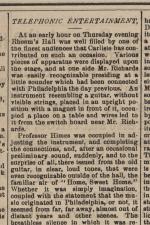
The Carlisle Herald describes Dickinson College Professor Charles F. Himes' lecture on the telephone, held the previous week on June 13, 1878, in this report.
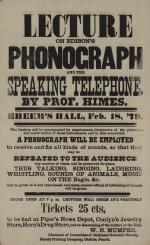
This broadside announces that Professor Charles F. Himes will deliver a lecture on Thomas Edison's phonograph and the "speaking telephone" at Rheem's Hall in Carlisle on February 18, 1879.
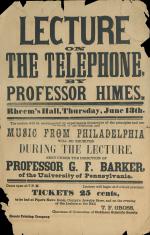
This broadside announces that Professor Charles F. Himes will deliver a lecture on "The Telephone" in Carlisle on June 13, 1878.
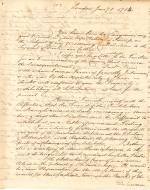
William Bingham writes to Benjamin Rush from London and discusses the state of financial support for Dickinson College.

Paul Peyton Appenzellar prepared this oration, entitled "Urban Growth at Expense of Rural," for the commencement ceremonies held June 5, 1895.

Natural Science Professor Charles F. Himes (Class of 1855) describes his experience in photographing the solar eclipse in Ottumwa, Iowa on August 7, 1869 .
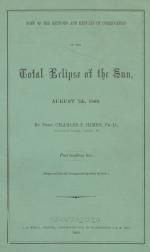
Natural Science Professor Charles F. Himes (Class of 1855) describes his experience in photographing the solar eclipse in Ottumwa, Iowa on August 7, 1869 for the Evangelical Quarterly Review.

Henry Martyn Harman writes to his father, Andrew Harman, about classes starting at Dickinson.

Franklin F. Bond prepared this oration, entitled “The Choice," for the commencement ceremonies held June 28, 1883. Authoring an original speech was among the graduation requirements for Dickinson College seniors at that time.

Caleb E. Burchenal prepared this oration, entitled “Evolution vs Special Creation," for the commencement ceremonies held June 6, 1900. Authoring an original speech was among the graduation requirements for Dickinson College seniors at that time.

Mary Ann Humrich prepared this oration, entitled “The Achievements of Our Age," for the commencement ceremonies held June 14, 1893. Authoring an original speech was among the graduation requirements for Dickinson College seniors at that time.

Elizabeth A. Low prepared this oration, entitled “The Development of Science from Superstition," for the commencement ceremonies held June 18, 1891.

Jennie May Taylor prepared this oration, entitled “Chaldni," for the commencement ceremonies held June 27, 1889. Authoring an original speech was among the graduation requirements for Dickinson College seniors at that time.

Joseph Priestley writes to Samuel Latham Mitchell and invites him to come visit at Northumberland as well as asks about a package that was supposed to have been sent.
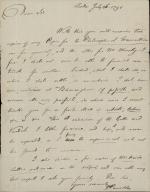
Joseph Priestley writes an unknown recipient and notes that he has enclosed "two copies of my Paper for the Philosophical Transactions." In addition, Priestley requests a "fresh stock of

Dr. Joseph Priestley writes to Rev. John Edwards and discusses their recent publications as well as a publication that they are both working on.

Joseph Priestley writes to Rev.

Joseph Priestley writes to the Duke of Northumberland, Hugh Percy, and asks for the Duke's patronage in order to write a history of experimental philosophy, continuing his previous work. Transcript included.

Joseph Priestley writes to Thomas Wedgwood about supplies for the laboratory that Priestley is building after his previous one was destroyed and discusses invitations to move from England to France.

A six page bibliography of 75 books written by Dr. Joseph Priestley.